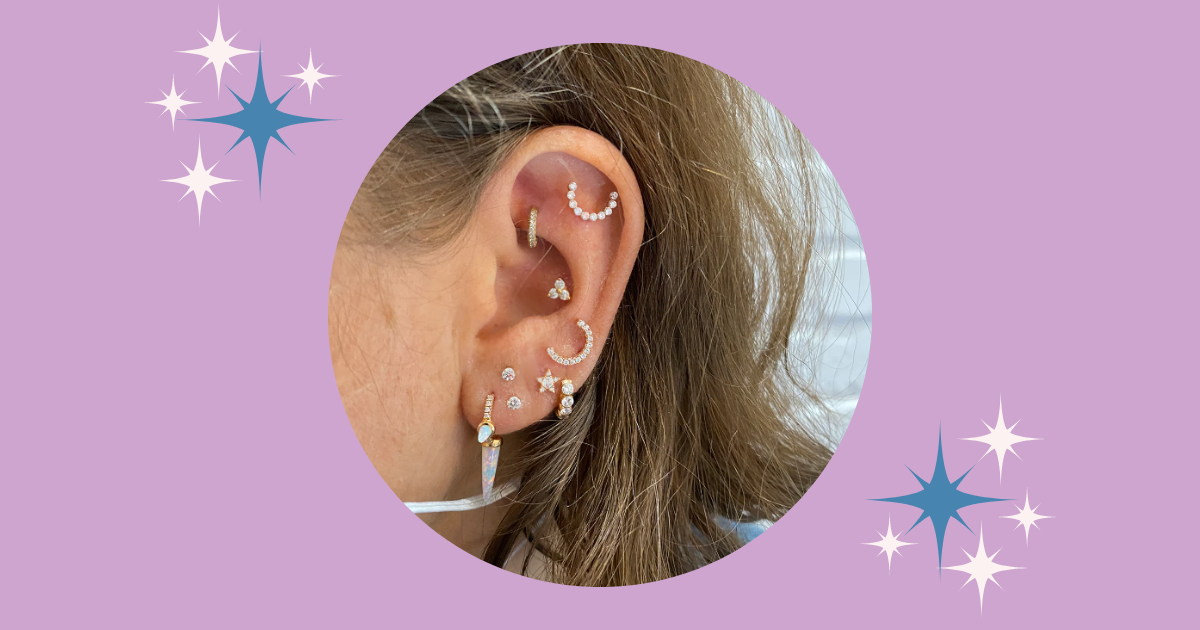What to Know Before Getting Your First Cartilage Piercing

Cartilage piercings have become very popular in recent years. As lovely as they can look there’s still a lot to consider before taking the plunge with a cartilage piercing. Here’s everything that you need to know before getting your first cartilage piercing…
It’s Normal to Feel Nervous
It’s totally normal to feel nervous and afraid before getting your ears pierced. According to research, knowing what to expect can help to alleviate anxiety.
We recommend that you do your homework before plunging in. Locate a reputable piercer to carry out the procedure. Read reviews to determine if you’ve found the right one. An experienced piercer will know which tools and techniques should be used in order to provide you with a pleasant experience and a satisfactory result.
Don’t be afraid of asking questions. Asking what is best for your case and knowing why will help you stay calm and relaxed during the process. Although piercing guns are popular, they are not recommended for cartilage piercings because they can cause permanent tissue damage. Make sure you ask your piercer what tools they use. If it’s a gun, you’re better off finding someone else. As a needle is best for cartilage piercings.
Eat and Drink Well, But Avoid Alcohol
Before the procedure, you have to fuel your body. Get plenty of rest the night before the procedure, and eat a full meal before heading to the studio. Professional piecers also advised bringing a vitamin C-rich snack to assist speed up the healing process.
If you drink alcohol before getting your ears pierced, you will bleed more. Furthermore, it will hinder the healing process. There’s also a chance you’ll fall unconscious during the piercing procedure. Alcohol can dehydrate your body and impair blood circulation, both of which are necessary for recovery.
It Will Hurt Your Ear
We won’t lie, you will feel pain, but the intensity can differ based on your tolerance and threshold. However, the discomfort is tolerable. It is also typical to have swelling at the spot. A dull, aching pain is frequently associated with the swelling. If you want, you could take non-prescription painkillers to lessen the discomfort.
Healing Doesn’t Happen Immediately
The primary distinction between an earlobe and a cartilage piercing is that the latter takes longer to heal. This is due to the fact that the fleshy area of the ear, known as the earlobe, receives sufficient blood supply, which is necessary for healing.
Earlobe healing period ranges between 3 and 6 months. Meanwhile, cartilage piercings may heal for up to a year. While you wait for the healing process to complete, you should continue to clean and care for your piercings.
Don’t Change Your Jewellery Too Quickly
You’ve most likely already shopped for jewellery for your cartilage piercing and can’t wait to replace the original jewellery with your preferred piece. Unfortunately, unless there is a problem with the material or size, this is not recommended. Otherwise, you can only replace the jewellery after it has healed.
You will wear the initial jewellery for a year. If you change the jewellery too soon, you may interrupt the natural healing process, and your body may reject the piercing or it may become infected. If you are unsure whether the site has healed, meet with your piercer and have them assess the piercing.
Sleeping Is Going To Be Difficult
If you prefer to sleep on your side, this will be a significant challenge because you will be required to sleep on your back during the healing period in order to avoid putting pressure on your ears. Returning to your regular sleeping position after a cartilage piercing might aggravate inflammation and swelling in your ears.
Professional piercers advised that you put a clean T-shirt over your pillow to safeguard your new piercing. Turn your pillow every night to prevent bacteria from getting into your piercing.
Ensuring Your Piercing Is Clean All The Time
Cleaning your new piercing as recommended by your piercer is one of the most important tasks in ensuring that it heals properly. The cleaning solution you use is important since the wrong product will cause irritation.
Saline solution is the best remedy for body piercings. Pre-packaged saline solutions are available at most pharmacies. Use a cotton bud or pad to clean the area twice a day with the solution.
Touching your piercing should be avoided, especially if you haven’t cleaned your hands. Bacteria can enter the area through dirty hands and trigger an infection.
Are you think of getting a cartilage piercing? Or do you already have one?
Read More: Things To Consider Before Getting A Tattoo







